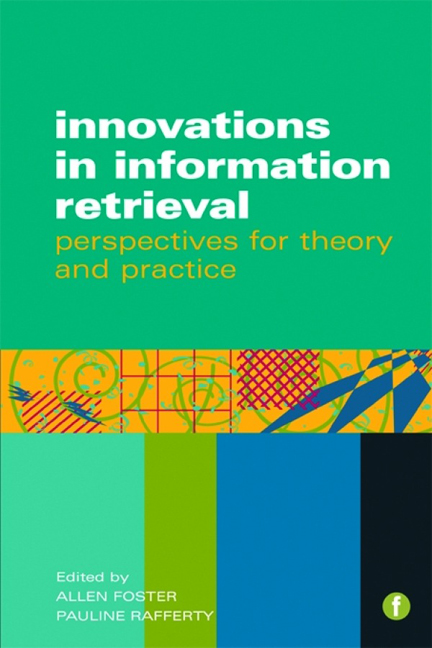Book contents
- Frontmatter
- Contents
- Figures and tables
- Contributors
- Foreword
- Introduction
- 1 Encountering on the road to Serendip? Browsing in new information environments
- 2 Classification revisited: a web of knowledge
- 3 Approaches to fiction retrieval research: from theory to practice?
- 4 Music information retrieval research
- 5 Folksonomies, social tagging and information retrieval
- 6 Digital information interaction as semantic navigation
- 7 Assessing web search engines: a webometric approach
- Index
3 - Approaches to fiction retrieval research: from theory to practice?
Published online by Cambridge University Press: 08 June 2018
- Frontmatter
- Contents
- Figures and tables
- Contributors
- Foreword
- Introduction
- 1 Encountering on the road to Serendip? Browsing in new information environments
- 2 Classification revisited: a web of knowledge
- 3 Approaches to fiction retrieval research: from theory to practice?
- 4 Music information retrieval research
- 5 Folksonomies, social tagging and information retrieval
- 6 Digital information interaction as semantic navigation
- 7 Assessing web search engines: a webometric approach
- Index
Summary
Introduction
This chapter considers fiction retrieval research and initiatives, providing an overview of some of the approaches that have been developed. In particular, it describes two recent approaches to fiction retrieval that have made use of theoretical concepts drawn from literary theory.
Fiction is an interesting information domain because it includes documents that serve two purposes, which are reading for pleasure and scholarly study (Beghtol, 1994, 3), but fiction retrieval has not always focused on both aspects. In the 19th century, the approach was to treat fiction from a knowledge perspective within general classification schemes. The Dewey Decimal Classification (DDC), the Library of Congress Classification (LCC) and the Universal Decimal Classification (UDC) contain classes for literature, with the main subdivision in each case being the language in which it is written. Further subdivision is possible based on literary form, historical period or the works of an individual author (Riesthuis, 1997).
It may be that there is a relationship between the development of literary studies as academic scholarship and approaches to fiction retrieval in libraries. In the UK, for example, Literary Studies as an academic discipline developed in the 19th century, institutionalized in the Mechanics’ Institutes, workingmen's colleges and extension lecturing circuits before its acceptance in the universities (Eagleton, 1996, 23). In its early days in the academy, English Studies was considered to be ‘an upstart, amateurish affair as academic subjects went, hardly able to compete on equal terms with the rigours of Greats or philology’ (Eagleton, 1996, 25). It is a relatively new academic discipline, although its research methods and interpretative approaches have a much longer history, at least since Aristotle's Poetics. We know that during the late 19th and early 20th centuries public libraries in England were still capping the number of novels that patrons were able to borrow, which suggests some nervousness about the role of the library and the librarian. There seemed to be concern, evidenced in the letters pages of the Library Association journal of the time, about whether libraries should be encouraging the reading of novels and the consumption of fiction for pleasure alone or whether they should be concerned with the intellectual ‘improvement’ of their patrons by encouraging the reading of serious, knowledge-based literature (Barr and Sturges, 1992).
- Type
- Chapter
- Information
- Innovations in Information RetrievalPerspectives for theory and practice, pp. 49 - 68Publisher: FacetPrint publication year: 2011



